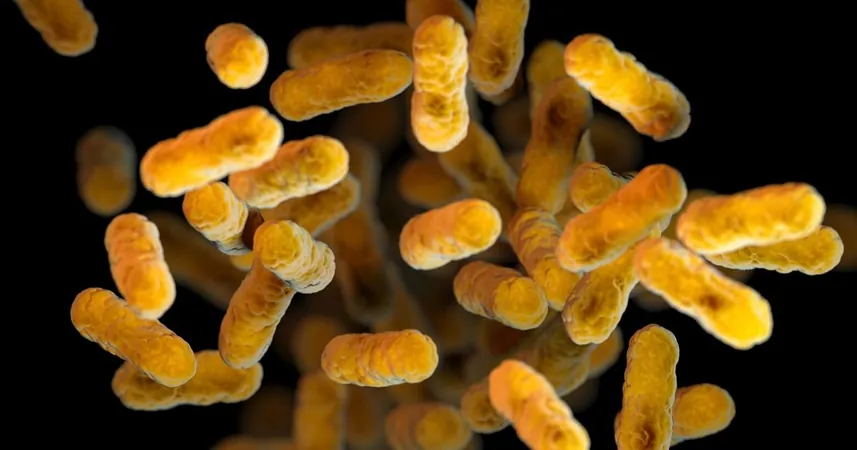
Whooping Cough Outbreak in Washington: A Crisis Unfolding with Nearly 1,200 Cases This Year!
2024-11-07
Author: Wai
Washington state is facing a concerning surge in whooping cough cases that could mark one of the worst outbreaks in over a decade. As of November 2, the Department of Health reported a staggering 1,193 cases of pertussis across 31 counties—an alarming increase compared to just 51 cases reported at the same point last year.
But it’s not just Washington experiencing this spike. Nationwide, the United States has recorded over 20,000 cases of this highly contagious disease this year, with seven states, Washington included, surpassing the 1,000-case mark.
Dr. Tao Sheng Kwan-Gett, Washington’s Chief Science Officer and pediatrician, emphasized the importance of vaccinations, stating, "The surge in pertussis cases is a stark reminder of how critical vaccinations are in protecting our most vulnerable, especially infants for whom it can be life-threatening."
In Washington, 28 hospitalizations have been reported, including 12 infants younger than one year. Disturbingly, over 80% of cases occurred in individuals under 18, with about 34% affecting children younger than four. The highest infection rates were observed in Whitman, Clark, and Chelan counties, with reported incidences ranging from 78 to 113 cases per 100,000 people.
Clark County stands out with more than 400 reported cases, the highest in the state. While eight counties have yet to report any whooping cough cases, King County has a relatively low incidence rate of approximately 6.5 cases per 100,000.
Whooping cough, often initially mistaken for a common cold due to mild symptoms like a runny nose, can escalate into severe coughing fits lasting weeks or even months. Infants are particularly vulnerable; they may not exhibit typical symptoms but can suffer from "dangerous pauses" in breathing, a condition that can be life-threatening.
To combat this outbreak, it is crucial for individuals of all ages to stay updated with their pertussis vaccinations. Dr. Kwan-Gett urges anyone experiencing symptoms to seek medical attention for potential testing and treatment.
The whooping cough vaccine, available in two forms—DTaP for children and Tdap for adolescents and adults—not only protects against pertussis but also against tetanus and diphtheria. Both forms are recognized as safe and effective; however, experts note that immunity wanes over time, necessitating booster shots.
In recent years, the state has seen fluctuations in its immunization rates. Currently, K-12 childhood vaccination rates hover around 90%, significantly lower than during the pandemic but slightly higher than pre-2020 figures. The situation remains particularly precarious for kindergarteners, who reported vaccination rates of just 87% during the 2023-2024 school year compared to 91% in 2020-2021.
Low vaccination coverage raises concerns about potential outbreaks of other vaccine-preventable diseases, such as measles and whooping cough, as schools operate in full swing again.
Public health officials are closely monitoring the ongoing situation in Clark County, which warned that about 65% of those who fell ill had never received the whooping cough vaccine. The continued decline in vaccination rates is alarming, echoing the sentiments expressed by Drs. Helen Chu and Collrane Frivold from the University of Washington, who pointed out the dangerous spillover effect from COVID-19 vaccine skepticism impacting childhood vaccinations.
Significantly, Washington has a history of severe whooping cough outbreaks, with a notable epidemic occurring in 2012 when nearly 5,000 cases were recorded. The state then had the third-highest rate of infections in the country. In 2015, another wave hit with around 1,380 cases.
Current recommendations suggest a booster dose of the pertussis vaccine for adolescents to prevent waning immunity. Pregnant individuals are also encouraged to receive the Tdap vaccine between 27 and 36 weeks of gestation to protect newborns until they can start their own vaccination series at two months old.
Washington's health officials are committed to monitoring the situation and collaborating with local health organizations to provide essential resources and support. The time to act is now—protecting our communities begins with staying informed and vaccinated!



 Brasil (PT)
Brasil (PT)
 Canada (EN)
Canada (EN)
 Chile (ES)
Chile (ES)
 España (ES)
España (ES)
 France (FR)
France (FR)
 Hong Kong (EN)
Hong Kong (EN)
 Italia (IT)
Italia (IT)
 日本 (JA)
日本 (JA)
 Magyarország (HU)
Magyarország (HU)
 Norge (NO)
Norge (NO)
 Polska (PL)
Polska (PL)
 Schweiz (DE)
Schweiz (DE)
 Singapore (EN)
Singapore (EN)
 Sverige (SV)
Sverige (SV)
 Suomi (FI)
Suomi (FI)
 Türkiye (TR)
Türkiye (TR)